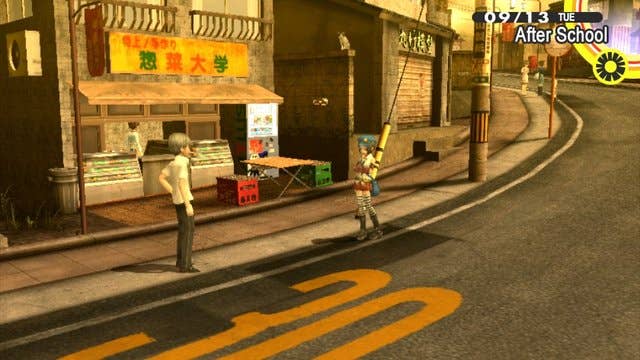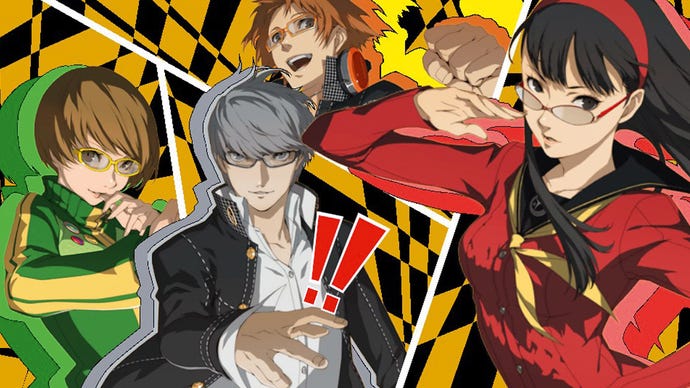Double Dip: What Halo and Last of Us Can Learn from Persona 4 Golden
More remastered versions are on their way as the generation gets properly underway. Here's what they can learn from the best of the bunch.
This article first appeared on USgamer, a partner publication of VG247. Some content, such as this article, has been migrated to VG247 for posterity after USgamer's closure - but it has not been edited or further vetted by the VG247 team.
Lately, I've been spending a lot of time thinking about the success of Persona 4 Golden.
I'm not sure it was ever supposed to be more than a port. In fact, the announcement that it would be appearing on the then-unreleased PlayStation Vita disappointed me for just that reason. I wanted a new game, not a handheld port. But ultimately, that was just what I ended up getting.
Now, Persona 4 Golden is almost universally regarded as the best game on the Vita, bar none. When the call went out for our three favorite Vita games (which you can read about next week), everyone was tripping over themselves to write about Persona 4. It's Exhibit A for why you should even own one of the things. Indie games may one day capture that honor for themselves, but there needs to be more of them. For now, Persona 4 stands alone.

There's a reason that Persona 4 Golden is so beloved despite being "just a port." It took the original game and added a raft of new content, including a fascinating new Social Link and an extended storyline that lasted into March (the original ended on December 25). It included a feature that made it possible to effectively crowd source suggestions on what to do over a given day in-game. And thanks to re-drawn HD menus and optimized screen resolution, it was beautiful. With these changes, Persona 4 Golden became accessible to a whole new collection of RPG fans, including myself.
As it turned out, Persona 4 Golden was the best case scenario for the HD and remastered versions of games that have taken over the market over the past few years. It was the definitive version of an already solid game, and its new features were designed with care to take advantage of its new platform. It was like playing a totally new game.
The benefits have been obvious. In Japan, Persona 4 seems to get bigger with each passing year, spawning both an anime series and a ridiculous amount of merchandise. It's also highly regarded in the west, giving it the sort of global cachet that few Japanese franchises enjoy these days. The appetite for more Personas has never been great. It's so great, in fact, that Atlus is releasing multiple spinoffs on top of a full-blown sequel.
That success has been in the back of my mind ever since Crystal Dynamics unveiled an enhanced version of Tomb Raider for the PS4 and Xbox One and Naughty Dog followed suit by announcing a remastered edition of Last of Us—both considerably different than Persona 4 Golden.
In game terms, what Naughty Dog and Crystal Dynamics (and possibly 343 Studios as well with Halo 4) are doing isn't that different from Warner Bros. or Universal kicking out blu-ray versions of their films. Remastering a video game is substantially harder than remastering a film (Naughty Dog called remastering Last of Us "hell" in an interview with Edge); but ultimately, a lot of the motivation is to do with being seen as a "next-gen" franchise while adding an additional revenue stream. And of course they also represent a foothold for whatever sequel will be released in the next couple years.
If Tomb Raider is any evidence of what to expect from these games, most of the changes will be tech-based. That is to say, they will have much nicer lighting and better textures with much higher resolution (though that last has been the subject of some... uh... debate). Last of Us and Tomb Raider also include their DLC packs, in effect making them glorified Game of the Year editions. Beyond that, there isn't much there for those who have already played the previous-gen releases—the definition of a double dip.
I wonder if that should be the case though. If Persona 4 Golden has proven anything, it's that a really well-made next-gen port can generate a groundswell that will reverberate beyond the established bounds of the franchise. When I talked to Crystal Dynamics about Tomb Raider, they told me that their goal for the remastered version was to attract a new audience that hadn't yet played the original. They also wanted to give people who had just purchased a PS4 or an Xbox One something to play. Fair enough; but when Tomb Raider launched on next-gen platforms, it generated little to no buzz outside of the established fanbase. It simply appeared and vanished again just as quickly. By contrast, we're still talking about Persona 4 Golden more than a year and a half after its release.
So what could have Tomb Raider—and down the road, Last of Us and Halo 4—have done to reach the level of Persona 4 Golden? I supposed what jumps out about me about Persona is the way that the development team tends to treat it as a living work. With each new version of Persona, Atlus has generally viewed it as an opportunity to continue refining the gameplay and the story. Persona 4 Golden has the aesthetic improvements, but it also dramatically expands upon the story. If Tomb Raider is a mere double dip, then Persona 4 Golden is the equivalent of the Final Cut of Blade Runner—unquestionably the final word on a great game.
Heaven knows that Halo 4 could use a little bit of a rethink. If the rumors are true and 343 Studios is planning on remastering it alongside Halo 1 through 3, there's plenty that can be done to improve the enemy variety, the mission pacing, and the final stage. It's a case study of a game that got strong reviews early and ended up floundering later because it was secretly kind of a middling shooter. I sort of hope that 343 will revisit it with the benefit of hindsight and do more than apply a fresh coat of paint
I sort of doubt that will be the case though. With so much emphasis being put on the tech side of gaming, development teams are under constant pressure to make sure that the graphics are sharp, even if it's to the exclusion of everything else. I'm sure that Crystal Dynamics would tell me that a lot of it was to do with the available resources and scheduling. After all, they had to work with two other studios just to make sure that it got finished in time. I'm guessing that they didn't have a ton of leeway with the budget either. Tomb Raider was released to fulfill a very specific commercial objective—get it out on next-gen—and that was about it.
Thus far, the sales of Tomb Raider for PS4 and Xbox One have been "favorable," according to Square Enix. I'm guessing much the same will be the case for Last of Us when it's released later this year. But there's quite a bit more to be gained with a remastered version than favorable sales and a foothold on next-gen platforms. Persona 4 Golden has already proven that much.




